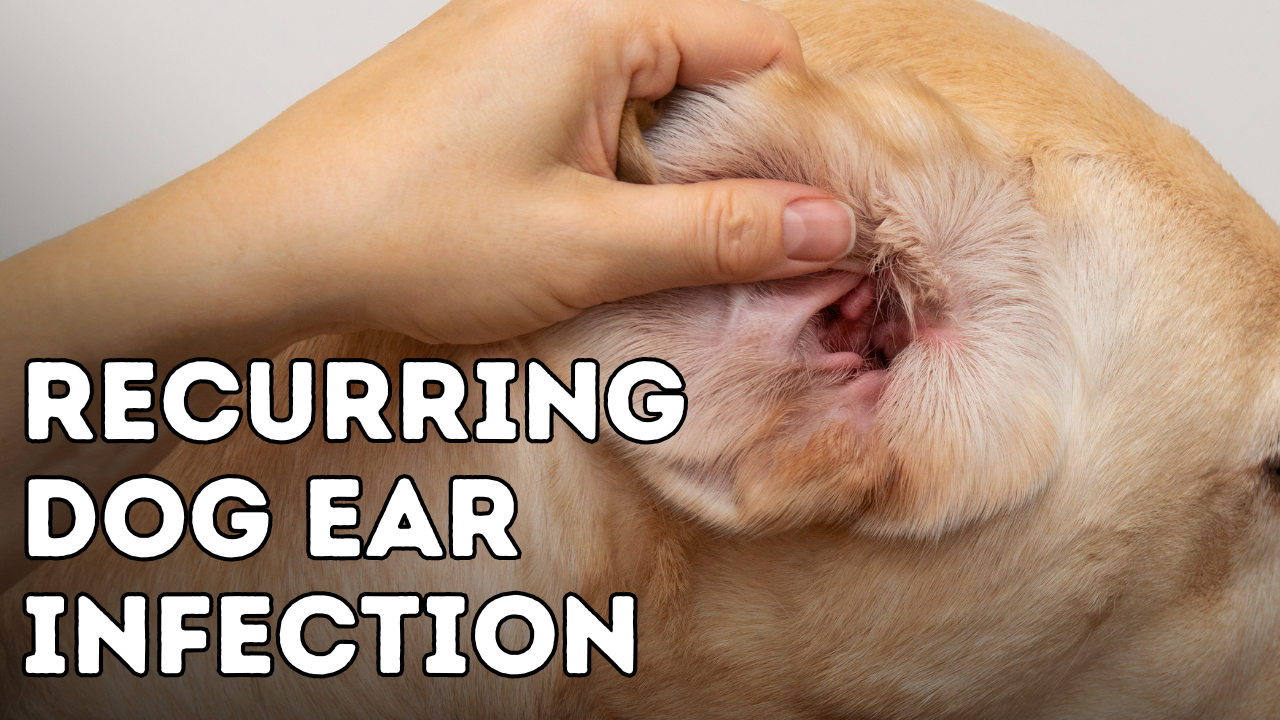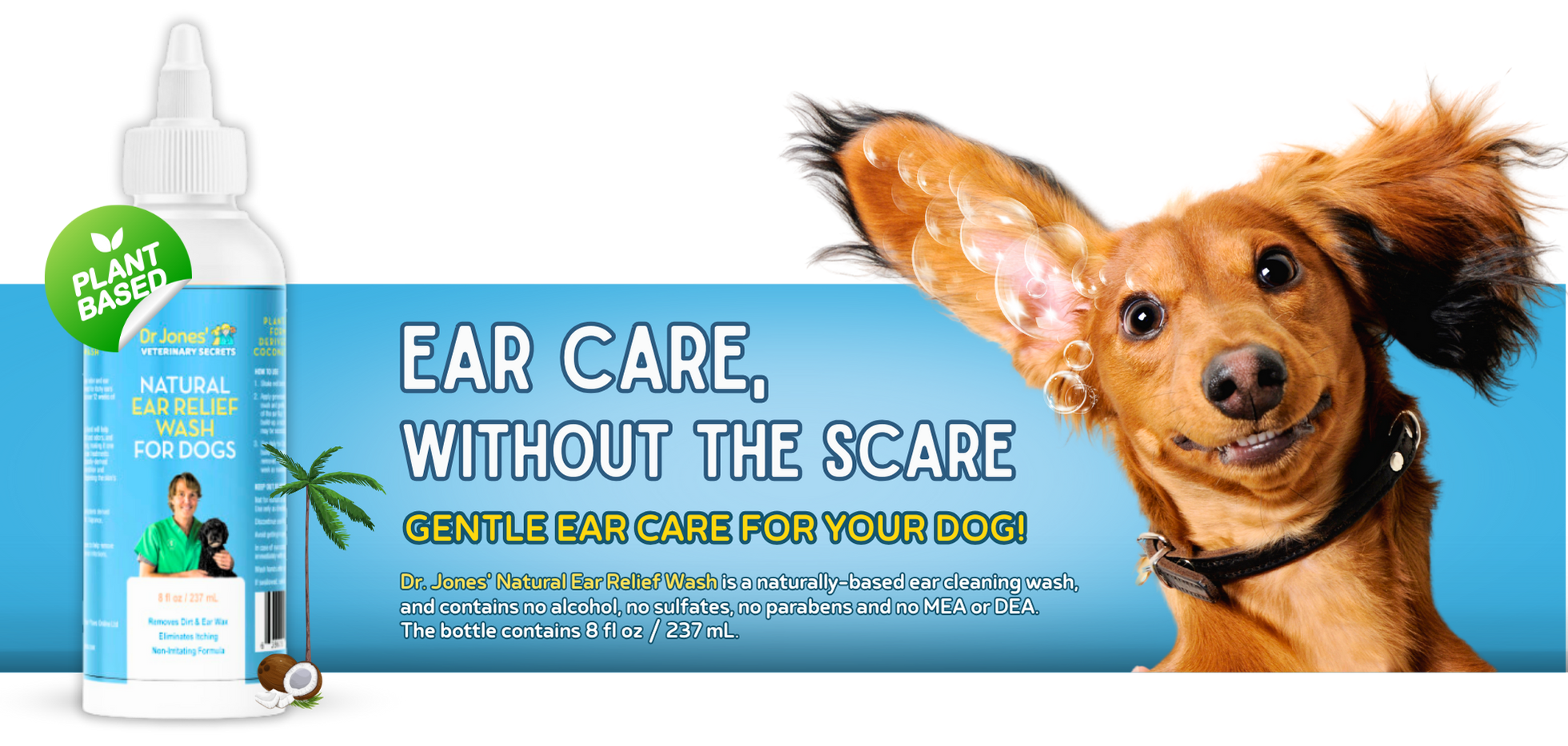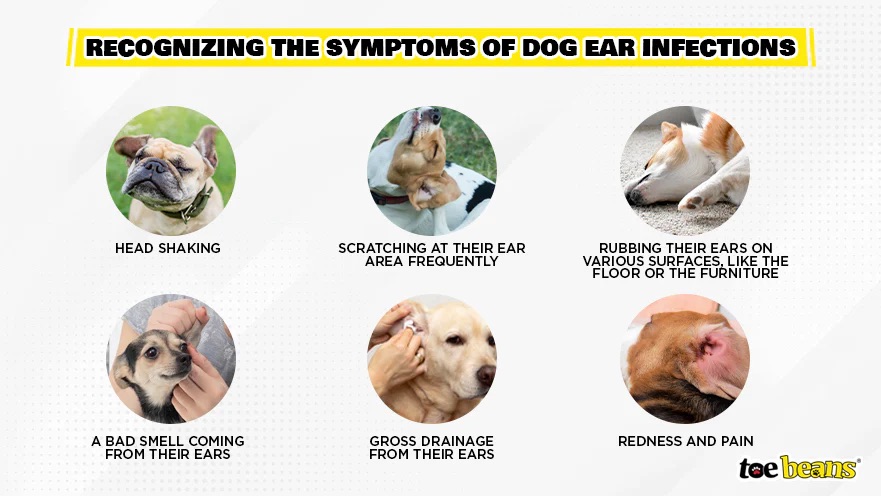Recurring Dog Ear Infection? Try this…

Having an ear infection can be so painful, so can you imaginewhat it’s like to have recurring ear infections like many of our dogs get? One of the most important ways to help your dog is with regular ear cleaning.
We now have a newDog Ear Wash made with natural ingredients- it has no alcohol so it will not be irritating or painful.
If you have a dog with an ear issue, I encourage you to try it:
Dr. Jones’ Natural Ear Relief Wash For Dogs


Understanding and Treating Your Pet’s Ear Infections
As a dedicated veterinarian, I often encounter pets experiencing discomfort due to ear infections. Recognizing the signs and understanding the causes can significantly help in effectively managing this common issue.
Signs of Ear Infections
If your pet exhibits the following behaviors and symptoms, it could indicate an ear infection:
- Persistent shaking of the head
- Scratching at the ears
- Noticeable redness on the ear flap or at the entrance of the ear canal
- Unpleasant discharge that may appear black, yellow, or brown
- Pain upon touching the ear
- Thickening of the ear canal
- Rubbing the face or ear against the ground or furniture
- Excessive licking of the paws, which often points to an allergy
- Itching or licking other body parts, also typically allergy-related
In severe cases, if the eardrum ruptures, symptoms may escalate to include a head tilt, abnormal walking, circling, falling over, or pain when opening the mouth fully.
Common Causes of Ear Infections
Ear infections are particularly prevalent in dogs and often stem from underlying allergies. They can also develop from water trapped in the ear after bathing or swimming. Dogs with large, floppy ears like basset hounds are especially prone to infections due to poor air circulation in their ear canals, which facilitates moisture buildup and subsequent bacterial and yeast growth. Yeast infections typically present with a black discharge, while bacterial infections may involve staphylococcus or, in more serious cases, pseudomonas.
Step-by-Step Treatment Approach
Step 1: Cleaning
Begin by cleaning the ears. A mixture of white vinegar (acetic acid) and water or green tea (in an 80:20 ratio) is effective for removing debris and killing yeast and bacteria. However, if your dog’s ears have open wounds, avoid vinegar as it can cause pain. Instead, use a soothing agent like olive oil mixed with Vitamin E. You can obtain a syringe from your local pharmacy to apply the solution accurately.
Dr. Jones’ Natural Ear Relief Wash: For regular maintenance, consider using my holistic, alcohol-free ear wash, which can be found here.
Step 2: Treating the Infection
For treating infections, Apple Cider Vinegar (ACV) is naturally antibacterial and antifungal. A diluted solution of ACV with warm water or green tea, applied in drops, can be very effective. For inflamed ears, a combination of sweet almond oil and lavender oil provides relief.
Burow’s Solution: An astringent solution effective for various skin conditions, including ear infections. Apply as directed, typically a few drops cleaned twice daily.
For yeast infections specifically, over-the-counter antifungal medications like Canesten or Monistat are effective. A homemade remedy combining Canesten and 1% Hydrocortisone cream (similar to many veterinary medications) can be applied directly to the ear or affected skin areas.
Step 3: Addressing Underlying Allergies
Managing allergies is crucial to preventing recurrent infections. Options include:
- Antihistamines: Benadryl and Ceterazine can reduce allergy symptoms, with dosages adapted for your pet’s weight.
- Herbal remedies: Stinging nettle is a natural antihistamine safe for pets.
- Supplements: High Absorption Curcumin and Omega-3s (from sources like Krill or Fish Oil) can reduce inflammation and are beneficial for ear health. You can find our recommended supplements here.

Concluding Thoughts
Regular ear cleaning is essential for pets with recurrent ear infections. Our Natural Ear Relief Wash is not only effective in cleaning but also conditions and moisturizes the ear canal, supporting the natural lipid barrier and promoting overall ear health.
P.S. Don’t forget, our new Dog Ear Wash offers a comprehensive solution for maintaining ear health and comfort.

There are Omega 3 fatty acids in her freeze-dried raw food and she is still getting recurring ear infections. She is a Pit Bull/Terrier mix so she doesn’t have the type of ears that should be prone to infections. I think she must be allergic to something and I might need to regularly use an ear wash to keep the infections from returning. Any thoughts would be greatly appreciated!
Yes, most common thing to do is by cleaning it to stop recurring infections, we do have the best ear wash you can use and can be found here:
https://shop.veterinarysecrets.com/pet-care/dr-jones-natural-ear-wash.html
Hi I received purchased Propolis with Mono Propylene Glycol to aid a gum infection for my dog .
I have been told that the M P G may be toxic to dogs . Iwould be most grateful what your thoughts are regarding this also could I trouble you to suggest something to fight a bacterial mouth infection and Hyperplasia.
Very many thanks xxx